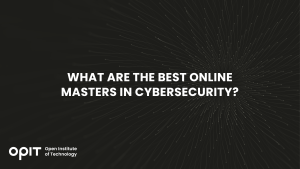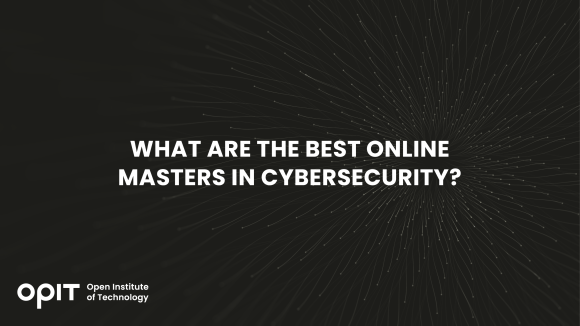

By 2023, cybercrime in the United States will cost businesses $8 trillion. That’s a staggering statistic, but even more remarkable is that a cyber attack happens every 39 seconds. The impact on business cannot be overstated.
For professionals seeking a career in cybersecurity, cybercrime has a silver lining. The demand for skilled and qualified cybersecurity graduates has skyrocketed, and finding the best online Master of Science in cybersecurity will open the doors of opportunity. Online degrees are affordable and flexible, equipping professionals with the skills they need to add value to any organization.
Exploring the Significance of Online Cybersecurity Education
Online coursework allows busy professionals to study at their own pace, no matter their geographical location. Using state-of-the-art delivery platforms to provide coursework designed by industry leaders and leading academics in cybersecurity is part of the attraction.
The best online master of science in cybersecurity programs will prioritize virtual learning to give students the opportunity to immerse themselves in real-world cyber defense scenarios. These degrees also provide insight into theoretical concepts.
Criteria for Selecting the Best Online Cybersecurity Programs
The best online cybersecurity degrees will offer a curriculum that is comprehensive and aligned with the needs of modern organizations. This includes providing students with the opportunity to immerse themselves in real-world scenarios.
Practical knowledge is essential for any prospective employee. Businesses want a professional who can analyze the threat environment, and provide insight into emerging threats, as well as provide guidance on how to mitigate these threats.
The answer to the question “What is the best online school for cybersecurity?” lies, at least in part, in the coursework. The best online cybersecurity programs will have course content that covers cybersecurity trends, technologies, and best practices. It will also be presented by faculty members and cybersecurity experts who have immersed themselves in the field.
For employers, the combination of practical experience and theoretical foundations is important, but so is the reputation of the school. Your chosen degree provider must be accredited as an online higher education institution by a globally recognized regulatory body.
Comparing Online Cybersecurity Programs
A certification that is recognized and respected by leading industry players is essential. However, other factors need to be considered when choosing the best online masters in cybersecurity.
A master’s degree program can be time-consuming, and for full-time professionals, the online study option is attractive. It allows them the flexibility to continue to meet their 9-5 obligations. State-of-the-art learning platforms and an interactive learning environment will contribute to a successful master’s experience.
The value of practical coursework should also not be underestimated. An online degree that offers access to cutting-edge cybersecurity tools and labs will enhance the learning experience. Immersion in real-world case studies and challenges will definitely enhance employability.
Demand for cybersecurity professionals is at an all-time high. Still, the relationship of the educational institution with industry leaders certainly enhances job prospects, as will career support services once the program is complete.
Best Online Masters in Cybersecurity
Since this field is in high demand, there’s no shortage of programs available for cybersecurity. Below are five of the top ones for a master’s degree.
1. Online Master’s of Science in Cybersecurity – Georgia Institute of Technology
This online, interdisciplinary master’s degree in cybersecurity can be completed in two to three years and has been developed for working professionals. It will allow advanced students insight into the vulnerabilities of cyber systems and the threats they face and supply professionals with the tools they need to protect network data. The total tuition cost is $9,920 (approximately 9,163 euros).
2. Online Masters in Cybersecurity – Johns Hopkins University
During this program, students will develop the skills required to protect the confidentiality, integrity, and availability of data, and to preserve and restore systems. The development of risk management skills is also prioritized. The course combines on-campus learning with eLearning with a total program cost of $50,910 (47,026 euros).
3. Master’s in Cybersecurity Risk Management – Georgetown University
This on-campus/online degree offers an integrated approach to coursework such as ethical considerations in cybersecurity practice, best practices for communications, computer science, the regulatory environment, compliance law, and coping with organizational change. Students will also get practical experience in developing and rolling out integrated cybersecurity strategies and crafting policy frameworks for business. The total cost of the degree is $50,391 (46,547 euros).
4. M.S. In Cybersecurity Online – Syracuse University
This master’s qualification allows students to develop the skills to apply machine learning strategies in a security context and explore topics such as neural network approaches, fraud detection, data mining, pattern recognition, and other valuable skills. Electives cover machine learning and biometrics. The cost of this degree is $56,160 (51,876 euros).
5. Masters in Cyber Security Engineering Online – University of San Diego
The coursework of this online/campus master’s qualification is aimed at providing those interested in various senior cybersecurity roles or seeking to work as a security engineer. The coursework has been developed in close consultation with the U.S. intelligence community, industry leaders, and government stakeholders. It includes subjects such as an introduction to cybersecurity concepts and tools, investigating threats and vulnerabilities, applied cryptography and secure network engineering. Students will pay $37,500 (34,639 euros) to complete the degree.
OPIT’s Leading Online MSc in Enterprise Cybersecurity
The OPIT Online Master’s Degree (MSc) in Enterprise Cybersecurity is an attractive option for those searching for the best online master’s in cybersecurity. The interactive, online nature of the coursework allows for incredible flexibility, students can study when they want and where they want, making it ideal for time-poor professionals.
During the course of the degree, students will be exposed to foundational concepts like network security, information assurance, and cybersecurity management. The practical nature of much of the coursework makes this master’s degree highly attractive to employers.
Why Choose OPIT for Your Cybersecurity Education Online
Any master’s degree in cybersecurity is only as good as the educational institution that provides the qualification. The OPIT Online Master’s Degree (MSc) in Enterprise Cybersecurity is made available by an organization that is internationally recognized and respected due (in part) to its accreditation with leading regulatory bodies.
Coursework counts when looking for the best online masters in cybersecurity. An OPIT master’s degree offers a blend of theoretical education with practical, real-world application, as well as access to renowned cybersecurity experts and a growing global community of cybersecurity professionals.
For busy professionals who want to further their careers in the ever-evolving field of cybersecurity and threat analysis, an OPIT master’s should be on the bucket list of the best online masters in cybersecurity.
Become a Master of the Cybersecurity Environment
The best online cybersecurity degrees combine practical coursework with foundational theory to increase the employability of the graduate. The courses need to be developed with industry needs in mind and should leverage the knowledge available from both academia and business to deliver exceptional value.
This integrated approach must be combined with post-graduate career support and a commitment to providing cutting-edge online accessibility to content and evaluation tools, as well as technology like sandboxes and real-world simulations, to enhance the practical value of the degree.
If the master’s degree you are evaluating does not tick these boxes, then perhaps OPIT is the higher education solution that you have been searching for.
Have questions?
Visit our FAQ page or get in touch with us!
Write us at +39 335 576 0263
Get in touch at hello@opit.com
Talk to one of our Study Advisors
We are international
We can speak in:




